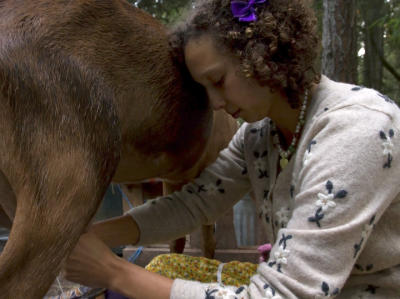[Image]
By Rady Ananda
Food Freedom
On Sept. 13, California’s Santa Cruz County Board of Supervisors unanimously passed a “Resolution Recognizing the Rights of Individuals to Grow and Consume Their Own Food and to Enter into Private Contracts with Other Individuals to Board Animals for Food.” [pdf]
Though only symbolic, the Resolution memorializes public assertion of the right to grow and eat food of their own choosing, and to collectively share in private herds, free from government interference.
This was done in response to armed raids on private food clubs and herd shares, as well as “cease and desist” letters sent by the state’s Dept. of Food and Agriculture (CDFA) to small farmers and herd share owners.
Two of the players behind the Resolution are Mali McGee and Dustin Jensen of Milk Mama Goat Farm. Along with four other herd shares, they also staged a public awareness “Milk In” on Sept. 7 at the downtown Santa Cruz Farmers Market. They served fresh goat milk in violation of state law.
But, like Howard Zinn said, “Protest beyond the law is not a departure from democracy; it is absolutely essential to it.”
The 23-year-old was absolutely delighted the Resolution passed. “We are on our way to local food sovereignty!”
Excitement over the Santa Cruz Resolution ignited food freedomists in Nevada County (CA), in the Sierra Nevada. They sent their congratulations and called on citizens: “Let’s make it happen here!”
McGee is not alone in seeing the armed raids and hyper-regulation as “misuse of taxpayer funds” and abuse of our sovereign rights as individuals to feed ourselves what nature provides, without government approval or interference.
“The current one size fits all regulation system prevents small producers from entering the game,” she said on her blog.
Indeed, that seems to be the point of hyper-regulation: to run the small operator out of business so that the food giants who donate to lawmakers can further monopolize the market. The last thing they want is for us to assert food freedom, a right so natural and inalienable the nation’s Founders didn’t think it needed to be included in the Constitution (except by inference in the 10th Amendment).
Contrary to what federal authorities asserted in a 2010 lawsuit, private citizens DO have the right to private contract, including herd shares:
The powers not delegated to the United States by the Constitution, nor prohibited by it to the States, are reserved to the States respectively, or to the people. ~Tenth Amendment
The Resolution demands that “a distinction [be] made between those farmers engaging in direct commerce with the public, as in the case of a farmer’s market or grocery store, and those individuals choosing to take part in a private herd share or community garden share.”
Sponsored by County Supervisors Neal Coonerty (3rd District) and Ellen Pirie (2nd District), the Resolution recognizes that local foodsheds boost the local economy, promote environmental sustainability, and provide healthy foods.
“I supported this resolution to encourage small-scale, locally produced, and sustainable agriculture in Santa Cruz County,” Coonerty told Food Freedom. “We have long been a community that supports and seeks a direct relationship with our food.”
He added that “State regulatory authorities need to develop and promote policies that support and foster locally grown and sustainable food movements.”
But there’s smoke on the horizon. Goat herder (and photographer) Dustin Jensen told Food Freedom, “We understand that the CDFA is preparing to crack down on all types of direct from the farm activities.”
He’s referring to a recent announcement by California Agriculture Secretary Karen Ross of a new advisory group that will focus on direct marketing of farm produce. Promising to cover farmers markets and other community supported agriculture groups, it will likely also consider private herd shares.
Brian Cote of CDFA’s Inspection Services advises that they plan to formalize the structure in the next few days and will post a public notice.
The new ad hoc committee is completely separate from the Certified Farmers Market Advisory Committee, Cote said in a phone call.
Jensen and others will build their next strategy based on the thrust of the new advisory group.
Known for its progressive libertarian principles, Santa Cruz County is no stranger to political activism. In 1992, the county seat became one of the first cities in the nation to legalize medical marijuana.
Comprising a little over 600 square miles, the tiny coastal county supports about 260,000 residents, most of whom live in one of only four incorporated cities, including Santa Cruz and Watsonville. Most of the county is mountainous, so its mega farms are “concentrated in the coastal lowlands of the county’s northern and southern ends,” notes Wikipedia.
In an interview with KFPA’s Living Room, McGee describes how farmers live in a state of fear because of government moves to shut down natural dairy producers, even though their products are not sold to the public. They have organized across the state to confront bureaucratic overreach into their private lives. (Starts at ~6:20.)
The county hosts at least 20 private herd shares that provide owners with meat and dairy products that are much cleaner and healthier than the Food, Inc. version. The animals are far better treated, too.
Not only herd shares, but garden shares have also sprung up in Santa Cruz, so that people can avoid the chemically doused, irradiated and genetically modified products that dominate the U.S. food supply.
County Supervisor Ellen Piri told Food Freedom, “We want to encourage people to raise food for themselves and their families. It’s a sensible, sustainable way of life.”
Certainly. And in a healthy society, family extends to community. Most of us will never raise cows or goats, but ten million Americans drink raw milk because our community herders are willing to do the grunt work for us. Government has no business interfering in private herd shares.
.
.
.
Last updated 9/23







YAY Santa Cruz!
they’re a good group — and, oy, does California need their farmers to unite against bureaucratic overreach.
I’m just commenting to let you be aware of what a great enctonuer my friend’s princess enctonuered going through your blog. She noticed a wide variety of details, including how it is like to possess a marvelous coaching nature to get other people easily grasp selected problematic topics. You really did more than our expectations. Many thanks for providing the good, dependable, informative as well as easy guidance on the topic to Ethel.
Pingback: The Progressive Mind » Santa Cruz adopts food freedom resolution supporting private herd shares | Food Freedom
Pingback: Milk Mama Farm, No Big Ag Scapegoat | Grass Rootz Cafe - Santa Cruz Sustainable Culture and Style Guide
I don’t know where to write, but I am only getting a blank gray page when I download FF to my mail. At Yahoo, there is some information, but it isn’t like it used to be. I checked the email on another computer with the same results, so it isn’t my computer. Sure would like to get this straightened out.
Let’s move past meat consumption. It will never be a victory for Earth if we continue to sustain ourselves with animal protein. Not only is it inefficient in terms of protein distribution (16lbs of veg protein–>1lb animal protein), but herds will eat the grasses and vegetation holding in the top soil, leading to soil erosion and accelerating logarithmically into desertification. Is it really worth it? Plenty more human meat around, why not, death is death right? Or is it that you only eat what you feel to be OTHER from you. Maybe if you could expand your definition of self then you would see that the herds on which you act like a parasite upon actually compose your body as we are connected through the evolutionary development of life on earth.
Pingback: Maine’s Food Sovereignty Law | The Food Law Firm